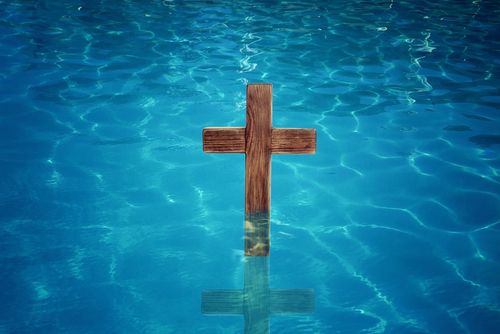 When most people hear the word “baptism,” they think of a Christian church where an infant is having water sprinkled or poured over its head. However, not all Christian sects practice baptism of infants, and some don’t baptize at all. There are also other religions that have purification rituals involving water.
When most people hear the word “baptism,” they think of a Christian church where an infant is having water sprinkled or poured over its head. However, not all Christian sects practice baptism of infants, and some don’t baptize at all. There are also other religions that have purification rituals involving water.
Christian Baptism of Infants
Baptism of infants has been practiced since at least the third century. It’s traditional in some religions, Catholicism as one example, for relatives or family friends to stand as godparents for the infant. Godparents are to be spiritual advisors for the infant for as long as they live.
Infants are baptized either by pouring water over the baby’s head or sprinkling water on the forehead. This is usually accompanied by the officiant saying, “[Full name of the child], I baptize you in the name of the Father, and of the Son, and of the Holy Spirit. Amen.” Baptism of infants is viewed as a sacrament, granting salvation and welcoming the child into the church.
Christian Baptism of Adults
In other Christian faiths, baptism is viewed as a personal decision to enter into a covenant with Jesus Christ, and can only be entered into by adults. A few denominations allow children as young as eight to make that decision and be baptized as adults. Adult baptism can be done by sprinkling of, pouring of, or full immersion in holy water. It’s not uncommon for adults to be baptized in a river, lake or even the ocean.
The Jewish Mikvah
The mikvah is a ritual bath used for purification. Jews partaking in the ritual of the mikvah bathe, clip their nails, and make sure no stray hairs are sticking to their body to ensure there is no barrier between themselves and the ritual water. Use of the mikvah involves full dunking under the water and reciting ritual prayers.
Jewish men typically use the mikvah on Friday before Shabbos. In some sects, Jewish men will use the mikvah daily. Grooms use the mikvah before their wedding.
Jewish women use the mikvah for the ritual of purification, seven days after menstruation ends. They’re also required to immerse before their wedding. There is a smaller mikvah women use to kasher their pots and pans, making them kosher for use in their kitchens.
Muslim Water Rituals
Muslims use water to cleanse themselves before their five daily ritual prayers. They wash their feet up to their ankles, their arms up to their elbows, and their faces before they pray. Each body part is washed three times, representing the physical, mental, and spiritual facets of each human being. This ritual cleansing is called wudu and is performed by both men and women.
Sikh Water Rituals
Any Sikh who has reached the age of accountability may be baptized in a ceremony called the Initiation of Khalsa. This includes Sikhs of any color, creed, or caste. Five Sikh Panj Pyare, literally beloved ones, will prepare the amrit, the nectar of sugar water that will be used in the ritual.
Initiates will drink five times before being anointed with the amrit, which involves having it sprinkled in their eyes five times and poured on their hair five times. Once all initiates have been anointed, the bowl of amrit is passed between them, each drinking in turn, until all the amrit is gone.
The Khalsa are believed to have descended from one father, Guru Gobind Singh, and one mother, Mata Sahib Kaur. Once they’ve been initiated, female Khalsa take the last name Kaur, and men take the last name Singh.
Clearly, water plays an important role in many of the world’s religions. Being anointed with water may be a central tenet to your faith, no matter what religious tradition you practice. Whether you’re a Christian, a Jew, a Muslim or a Sikh, you may believe that water is both purifying and cleansing, and may also be holy.